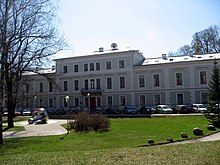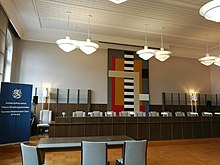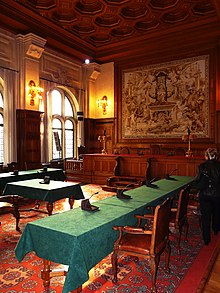Court
A court is an institution, often a government entity, with the authority to adjudicate legal disputes between parties and administer justice in civil, criminal, and administrative matters in accordance with the rule of law.Courts generally consist of judges or other judicial officers, and are usually established and dissolved through legislation enacted by a legislature.A court is any person or institution, often as a government institution, with the authority to adjudicate legal disputes between parties and carry out the administration of justice in civil, criminal, and administrative matters in accordance with the rule of law.According to William Blackstone's Commentaries on the Laws of England, a court (for civil wrongs) is constituted by a minimum of three parties: the āctor or plaintiff, who complains of an injury done; the reus or defendant, who is called upon to make satisfaction for it; and the jūdex or judicial power, who is to examine the truth of the fact, determine the law arising upon that fact, and, if any injury appears to have been done, ascertain and by its officers apply a legal remedy.[3] The meaning of a judicial assembly is first attested in the 12th century, and derives from the earlier usage to designate a sovereign and his entourage, which met to adjudicate disputes in such an enclosed yard.According to William Blackstone's Commentaries on the Laws of England, a court (for civil wrongs) is constituted by a minimum of three parties: the āctor or plaintiff, who complains of an injury done; the reus or defendant, who is called upon to make satisfaction for it; and the jūdex or judicial power, who is to examine the truth of the fact, determine the law arising upon that fact, and, if any injury appears to have been done, ascertain and by its officers apply a legal remedy.Jurisdiction is defined as the official authority to make legal decisions and judgements over a person or material item within a territory.Common law courts were established by English royal judges of the King's Council after the Norman Invasion of Britain in 1066.



Court (disambiguation)Old BaileyLondonThomas RowlandsonAugustus PuginInternational Court of Justiceinstitutiongovernmentauthoritylegal disputespartiesadminister justicecriminaladministrativerule of lawjudgesjudicial officerslegislationlegislatureconstitutionjurisdictiontrial courtsappellate courtsadministrative courtsinternational courtstribunalspersonadjudicateadministration of justicecommon lawcivil lawlegal systemsdispute resolutionrights of those accuseddefensejudiciarycourtroomcourthouseWilliam BlackstoneCommentaries on the Laws of Englandcivil wrongsplaintiffdefendantofficerslegal remedybailiffsreportersSupreme Court of Estoniapresiding officerattorneysbarristerspersonal jurisdictionsubject-matter jurisdictionKavalaGreeceterritorial jurisdictiongeneralexclusiveappellateUnited States federal courtsdiversity jurisdictionspecialized courtsSupreme Administrative Court of Finlandtrialsoriginal jurisdictionfinders of factjury trialsfinders of lawbench trialsAnglo-AmericanappealsCrown CourtRoman lawCorpus Juris CivilisFrenchGerman legal systemsNorman Invasion of BritainEnglishAmerican legal systemsinquisitorial systemadversarial systemProcedural lawcivil procedurecriminal procedureInternational Criminal CourtThe HagueLok AdalatPermanent Court of ArbitrationUnited NationsInternational judicial institutionInternational Court of ArbitrationAdministrative courtAdmiralty courtAppellate courtCircuit courtCity courtConstitutional courtCommercial courtCommunity courtCourt of cassationCourt of marine inquiryCourt of recordCourt-martialDistrict courtDomestic violence courtDrug courtDWI courtEcclesiastical courtEquity courtExtraordinary courtFamily courtGirl's courtHigh courtInternational courtJuvenile courtLabor courtLand courtLivability courtLower courtMental health courtOrdinary courtPatent courtProbate courtSmall claims courtSpecialized courtSuperior court

